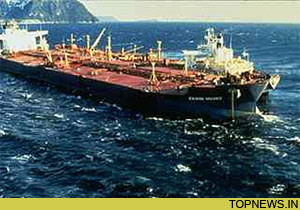Twenty years after Exxon Valdez, oil spills still threaten coasts
 San Francisco - Few lessons have been learned from Exxon Valdez, as oil spills are a regular occurrence 20 years after the worst ecological disaster in US history, environmentalists warned Tuesday.
San Francisco - Few lessons have been learned from Exxon Valdez, as oil spills are a regular occurrence 20 years after the worst ecological disaster in US history, environmentalists warned Tuesday.
On March 24, 1989, a massive tanker captained by a man who had allegedly been drinking, sailed outside regular Alaskan shipping lanes and hit a reef.
The Exxon Valdez, at the time one of the most advanced tankers in the world, split, spilling approximately 40 million litres of crude oil into the delicate and pristine Arctic environment of the remote Prince William Sound.
The oil dispersed over an area of 28,000 square kilometres and covered approximately 2,000 kilometres of rugged coastline. It killed an estimated 600,000 to 700,000 birds, fish and sea mammals.
"The anniversary of the Exxon Valdez disaster should serve as a reminder of the threat oil poses to our oceans and coasts," said Carl Pope, executive director of the environmental group, Sierra Club.
"Contrary to what the oil industry would like us to believe, there is no effective method for cleaning up an oil spill. Where there are tankers and offshore drilling, there will always be spills."
Earlier in March, a tanker off the coast of Australia crashed, spilling 197,000 litres of oil and shutting down local fisheries.
But it's not just tanker accidents that spew oil into oceans, destroying fisheries and the coastal economies that rely on them. Since 1993, US offshore drilling has sent an average of 47,800 barrels of oil a year into the sea, the Sierra Club said.
The World Wildlife Fund (WWF) warned last week that another horrific accident is waiting to happen, even as the damage from Exxon Valdez continues to blight the region.
In a report entitled, Lessons Not Learned, WWF recommends a moratorium on new offshore oil development in the Arctic "until technologies improve to a point where an adequate oil-spill clean-up operation can be performed."
WWF also recommended that the most vulnerable and important areas of the Arctic be deemed permanently off-limits to oil development because oil spills would be next to impossible to clean up or would cause irreparable long-term damage.
"While there has been little improvement in technologies to respond to oil-spill disasters in the last 20 years, the Arctic itself has changed considerably and is much more vulnerable today," said Neil Hamilton, leader of WWF's Arctic Programme.
Bill Chameides, dean of Duke University's Nicholas School of the Environment and a member of the National Academy of Sciences, agrees with the WWF that despite one of the largest cleanup efforts in history much of the damage has proved irreversible.
"People may assume that because the spill happened 20 years ago, the effects are long gone. But they persist - and may continue for years to come," said Chameides, who estimates that it could take as much as 100 more years for all the oil to dissipate.
Oil giant Exxon spent about 2 billion dollars on the clean up operation. dpa